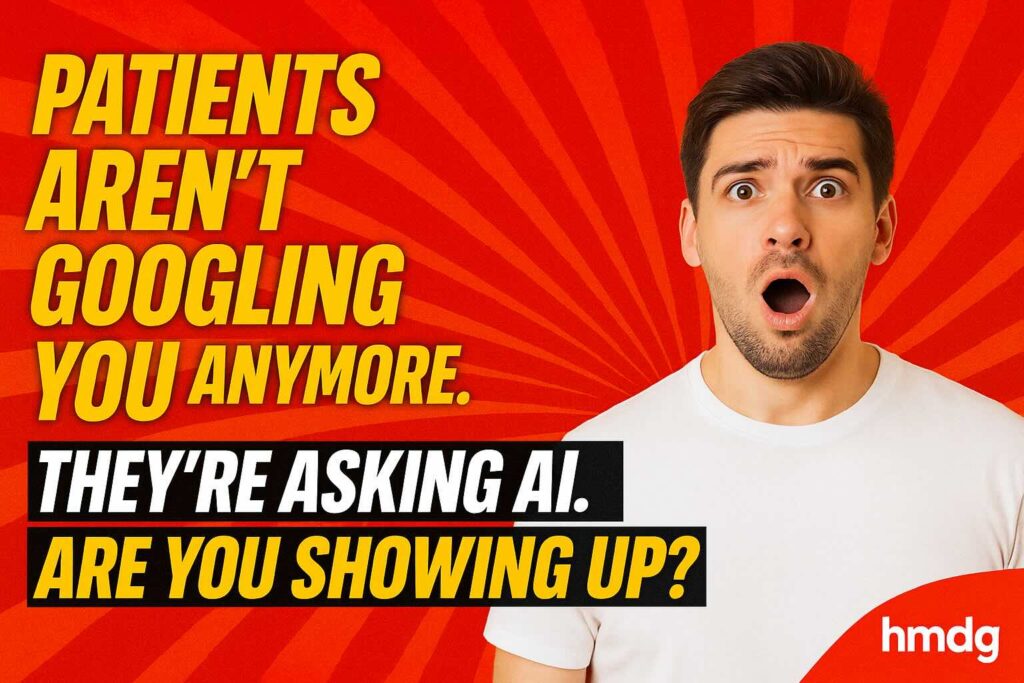Marketing a healthcare clinic has always been relatively simple (if a bit time-consuming). For the past five years at HMDG, we’ve focused on what I’ve always called the foundations.
Build a great website
Be visible on Google
Show off your brand through high-quality photography and messaging
Run Google Ads to respond to market demand
Offer a great patient experience by using best-of-breed technology
These things are still critical. In fact:
If you don’t have a great website, you’re just falling behind the competition. You won’t convert visitors.
You’ve got to respond to intent. Google Ads is still the number one way to generate ROI.
If you’re still using stock photography, you’ve got no brand and no personality. You look like you’re stuck in the 90s with a picture of a red pain-dot on a neck.
SEO matters. You need to rank organically and show up in the map pack.
And don’t make me talk about booking systems again…
These aren’t separate tactics. They all intersect. You can’t run effective SEO without a good website. Your website won’t build trust without great photography. Your clinic won’t convert if people can’t book easily.
It’s all changed
Over the past 6 months, the rules of marketing clinics have started to shift dramatically, and that shift is about to accelerate faster than Trump’s tariff plans. My ISA looks like it’s having a fit tbh.
Search behaviour is changing. Search engines themselves are changing. And with the rise of generative AI, visibility, the single most important principle in marketing, is now governed by a different set of rules.
Visibility is everything, if you’re hard to find, you will fail. Visibility is marketing oxygen. That’s why drinks brands pay for shelf space in pubs. It’s why high-street shops outperform backstreet ones. And it’s why clinics that appear first in Google get most of the bookings.
For years, SEO + PPC worked together to secure visibility. When someone searched for a physio, chiro, massage therapist or podiatrist in your area, Google Ads and Google Business Profile (formerly GMB) were your frontline.
Then generative AI arrived. And everything changed.
The world of marketing healthcare clinics has changed, forever! Patients don’t just search on Google anymore and even those who do, use Gemini or AI mode. They’re also asking ChatGPT, Gemini, and Grok which physio, chiro, or podiatrist to book. If your clinic isn’t visible there, you’re invisible.
It’s the biggest shift in search since Google Ads. Most clinics haven’t even noticed it’s happening, which is brilliant news for those who move early.
What is AI SEO (or GEO) and Why Should Clinics Care?
AI SEO, also called Generative Engine Optimisation (GEO), is about making sure your clinic is the one recommended when patients use AI tools like ChatGPT, Gemini, or Grok to ask health-related questions.
Think of it like this: traditional SEO was about getting onto the first page of Google. GEO is about getting into the one box of answers an AI gives back.
Traditional SEO Flow: The Old Way
Here’s how it worked for years:
- A patient types “physio Manchester” into Google.
- Google spits out 10 blue links, some map listings, and a few ads.
- The patient scrolls, clicks one or two sites, maybe looks at reviews, and eventually makes a decision.
- You had multiple chances to win that patient because they were browsing around.
This was all about being visible in a list. Even if you weren’t number one, you could still pick up patients in positions two, three, or even lower down if your website stood out.
AI SEO Flow: The New Way
Now let’s see how it works with AI:
A patient types into ChatGPT:
“Who’s the best physio in Manchester for back pain, open today, and how much do they charge?”
- ChatGPT doesn’t give 10 options. It gives one answer.
- If it recommends another clinic and not you, that patient is gone. No second chance.
- AI works differently. Instead of showing a list, it filters all the available information and chooses the single clinic it trusts most. It’s like asking a friend for a recommendation. You don’t get 10 names, you get one.
Why That’s Such a Big Deal
In traditional SEO, being “on the page” gave you visibility. Even if you weren’t top, you still had a chance.
In AI SEO, it’s winner-takes-all. The clinic that gets recommended wins the patient, and everyone else loses. There’s no “oh, I’ll click the second or third option.”
That’s why GEO matters so much. If your clinic isn’t structured in a way that AI can understand and trust, you won’t even be in the running.
An Analogy
Think about how restaurants work on Google Maps. If you search “pizza near me,” you get a long list of options and you can browse through them.
But imagine if Google Maps only ever showed you one pizza place it thought was best. If it isn’t your restaurant, you don’t get a look in. That’s exactly what’s happening with AI search.
The Stakes for Clinics Couldn’t be Higher. Adapt or Die.
- With traditional SEO, not ranking top meant fewer bookings — but still some visibility.
- With AI SEO, not ranking top means no bookings from AI search.
And because patients are moving quickly to AI, this isn’t optional. It’s the difference between being recommended and being invisible.
Clinics need to stop thinking about SEO as “ranking for keywords” and start thinking about it as being the trusted single answer AI chooses. That’s what GEO is all about.
How Patients Search Today
Think about how you search yourself.
- Google search: “chiropractor near me.”
- AI search: “Who’s the best chiropractor near me that can help with sciatica, has appointments this week, and takes AXA insurance?”
The difference is enormous.
From Keywords to Conversations
Patients used to type short, blunt keywords into Google. That’s how search was designed, you had to talk like a machine to get the right result. Now, with AI, people talk like they do with a friend, in full sentences, with all the details wrapped in.
As I said, instead of “physio Manchester,” the query becomes:
“I need a physio in Manchester who can see me tomorrow evening for knee pain after running, what are my options?”
AI understands the intent, context, and urgency. It gives one clear answer.
From Browsing to Booking
AI is moving patients straight from search to decision. And this is important. Customers don’t want to sift through multiple options, they want the one best option. And once AI provides that, patients are far less likely to keep shopping around.
From One-Off to Relationship Search
Here’s something else to think about, AI remembers. Once a tool like ChatGPT or Gemini sees a clinic as credible, because your information is consistent, reviews are strong, and patients book successfully, it’s more likely to recommend you again and again.
That means visibility in AI isn’t just about today’s query. It builds momentum. Every time your clinic is recommended and the patient follows through, the engine becomes more confident you’re the right answer next time too.
From Information to Trust
Behaviourally, patients are also changing how they weigh decisions:
- They trust AI to filter out bad options.
- They expect AI to give an answer quickly, without the legwork.
- They’re less tolerant of unclear pricing, missing booking links, or vague service pages.
If your clinic isn’t presenting that clarity, opening hours, pricing, conditions treated, insurance accepted, reviews, and easy booking, you simply won’t be shown.
The Big Shift
This is the biggest behavioural change in patient search in 20 years:
- Short, machine-like queries → Natural, conversational questions.
- Browsing multiple websites → Accepting one trusted answer.
- One-off transactions → AI-driven recommendation loops.
Clinics that adapt early will be the names AI tools learn to trust, and once that trust is built, it’s incredibly hard for competitors to dislodge.
Patient Journey Scenarios
Here’s how it plays out in real life:
Scenario 1: Busy Parent with Back Pain
Google behaviour: Types “physio near me.” Gets ten results. Clicks three sites. One has no pricing. One has no online booking. Finally finds one with evening slots after 25 minutes of searching. Books.
AI behaviour: Types into ChatGPT: “Which physio near me can see me this evening for back pain, takes AXA, and costs under £80?” AI replies: “I recommend [Clinic X]. Appointments available tonight at 7pm, initial consult £75, book online here.”
Booking done in one step.
Scenario 2: Runner with Knee Pain Before a Marathon
Google behaviour: Searches “sports physio London.” Clicks five sites. Reads blogs about running injuries. Has no idea who’s actually available or how much it costs. Books two days later.
AI behaviour: Searches in Gemini: “Best-reviewed sports physio in London for knee pain, near King’s Cross, available this week.”
Gets one answer with reviews, price, and booking link. Books instantly.
Scenario 3: Older Patient with Private Insurance
Google behaviour: Searches “chiropractor near me Bupa.” Gets ads from five different clinics. Calls two of them, gets voicemail. Finally books on the third try.
AI behaviour: Asks ChatGPT: “Which chiropractor near me is Bupa recognised and treats sciatica?”
Gets one clear clinic name with insurance details and pricing. Books online.
Why Most Clinics Are Already Falling Behind
As is historically true with healthcare, there’s a general indifference and sometimes fear of digital change. Innovation and digital transformation is always slower than in other industries, indeed many clinics still don’t have online booking never mind the ability to communicate via WhatsApp.
I saw a post on LinkedIn recently with a ton of clinic owners lamenting AI call answering as if the patient must speak to a real person or they might die, despite the fact that the majority are losing tens of thousands a year in lost appointments because they don’t answer the phone after 5pm and in fact barely 50% of calls are answered even during working hours.
They’re still focused on endless generic blogs e.g. “5 Stretches for Back Pain,” “Best Shoes for Runners.” and are intent on building out social funnels, running Facebook ads giving away free assessments. Funnels and freebies attract the wrong crowd, bargain hunters who no-show, cancel, or disappear after the first session.
Of course often the endless fake gurus in the MSK industry are to blame but things do need to change.
Real-World Examples of Falling Behind
Clinic A: Paying an agency £800/month to “do SEO.” They’re getting two blogs a month and ranking for “what is plantar fasciitis.” No patient ever booked off that search.
Clinic B: Running Facebook ads offering “Free Spine Screens.” It fills the diary with people who don’t return, meanwhile the clinic’s reputation sinks because they’re known as “the cheap place.”
Clinic C: Hasn’t touched their site in five years. No service pages, no FAQs, no reviews. Invisible to AI tools. Still wondering why patient numbers are dropping even though they’re “word of mouth only.”
What Clinics Should Be Doing Instead
- Clear service and condition pages that AI can actually use.
- Accurate, up-to-date FAQs that answer patient questions.
- Reviews and trust signals everywhere.
- Minimal-click booking that makes it easy for patients to convert.
How AI Tools Decide Who to Recommend
AI doesn’t make guesses, it ranks based on signals.
Key factors:
- Website structure: Clear service pages, easy to crawl.
- Patient questions answered: Pricing, insurance, conditions treated.
- Schema markup: Structured data (opening times, services, location).
- Reputation: Google reviews, consistency across listings.
- Trust signals: Links, credibility, proven expertise.
What Your Clinic Needs to Do Right Now
1. Fix Your Website Structure
-
Separate pages for each service and condition.
-
Clear headings and copy written for patients, not algorithms.
2. Answer the Right Questions
AI thrives on clarity. Have FAQs for:
-
“How much is a physio session?”
-
“Do you accept private insurance?”
-
“Can shockwave therapy fix plantar fasciitis?”
3. Implement Schema Markup
It’s the code that tells Google and AI exactly who you are, what you do, and when you’re open.
4. Build Reputation
Fresh reviews, accurate listings, consistent branding.
5. Combine GEO + SEO
Don’t ditch Google, you still need traditional SEO. The winners will dominate both.
It’s all About the Money – The Economics of Visibility
Let’s run the numbers.
- Average patient lifetime value: £250–£500.
- 200 people visit your booking system each month.
Scenario A (poor AI/SEO presence):
- Only 5% convert.
- 10 patients → £2,500 revenue.
Scenario B (strong AI/SEO presence):
- 20% convert.
- 40 patients → £10,000 revenue.
That’s a £7,500 monthly difference, or £90,000 a year, simply because your clinic isn’t optimised for how patients now search.
Case Example: Invisible vs Visible
Clinic A (invisible to AI):
- One services page.
- “Contact us for pricing.”
- 6 reviews.
- Booking hidden in the footer.
Clinic B (visible to AI):
- Separate service pages for each condition.
- Pricing, insurance, opening hours clearly displayed.
- 250+ reviews.
- One-click booking.
When a patient asks Gemini “Who’s the best-reviewed physio near me for knee pain?” Clinic A doesn’t exist. Clinic B gets recommended.
The Clinics That Will Win
The winners aren’t the ones dancing on TikTok or running “free consultation” funnels. They’re the ones who:
- Get the basics right.
- Answer questions directly.
- Make booking seamless.
- Build trust with reviews and credibility.
AI doesn’t care how many Instagram followers you have. It cares if you’re the best answer to a patient’s problem.
The End!
For some… AI SEO isn’t the future. It’s the present. Clinics that adapt will quietly dominate their towns while everyone else is ignoring AI.



